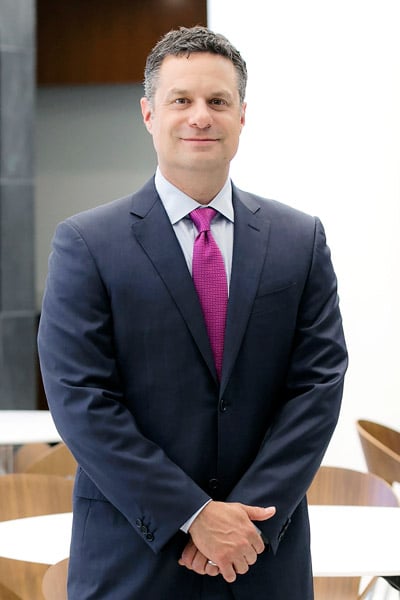The Advisory Board Company (ABC), a best-practices firm that provides technology and consulting to healthcare providers—hospitals, in particular—to help them improve their performance in delivering healthcare, has skyrocketed from its humble beginnings as a one-person entity conducting business from an apartment to a 3,600-person behemoth. But ask any employee, and they’ll tell you there’s still work to be done—especially when it comes to company growth.
One of those employees is Evan Farber, chief legal officer and corporate secretary, who had an early front-row seat to the power of hard work and determination. His own father was a pharmacist at a chain retail pharmacy before he eventually opened up his own pharmacy. Local residents would come to see him all the time to ask medical questions, and he would stay late to make sure customers’ prescriptions were filled.
As it turned out, Farber found a career in healthcare, but it wasn’t the career path that he took from his father. Rather, it was his work ethic and his eagerness to help others that motivated him more.
“I think what I learned more from him was the work ethic,” Farber says. “He’s also an immigrant, so seeing him start his own business and how the success of his business was really dependent on how well he served people was what I took away—hard work with a service mindset, seeking to establish sincere relationships with his customers. For me, I’ve tried to do the same thing: have the same work ethic and be able to connect what I’m doing with a benefit.”
Farber’s early exposure to a healthy work ethic makes it not much of a surprise, then, that he landed with a company that was crafted from the ground up. Founder David Bradley started the Advisory Board Company from his apartment in 1979, and when Farber started as a general counsel, the company employed approximately 900 people. Now, the employee base is four times that amount. Despite the growth, success, and the fact that ABC is publically traded company, Farber and his company still want to solve problems of mission-oriented companies, which would then lead to and require further growth.
“The keys to growing are identifying problems and finding solutions to them. That just leads to growth,” Farber says. “I think we’ve always been able to attract and retain the best and brightest within the industry to identify the most pressing issues and problems and try to get ahead of them in healthcare. The problems are becoming bigger and more complex, and being successful in helping identify and solve those problems has led naturally to the company’s growth and success.”
While company growth is a positive, it also can pose a challenge, especially in the healthcare industry, and ABC is no exception. It’s in the business of helping health systems make better decisions, but they need to have more accurate, actionable data to be able to do that. Fortunately, more data is becoming more accessible for organizations to monitor patient outcomes and the costs of delivering services, which will help health care providers operate better. On the surface, that is a good thing, but it adds another layer of responsibility: keeping that data secure. However, that is a challenge Farber is willing to accept if it means he and his company can help others fulfill their missions and achieve their goals.
“For us, the more we serve an organization, the more we need data to serve them better,” he says. “It’s all sensitive information, and we and our healthcare clients are trusted stewards of the patients’ data. We have to make sure we have a robust information security program in place to maintain patient privacy and to ensure that the data is used only for permissible purposes.”
A business as successful as ABC might shy away from complex situations and ride on its current success, but that’s not how this company operates. For example, more hospitals are transitioning to a value-based reimbursement models, and people are essentially being tied to outcomes. As this happens, providers and physicians want more control over what’s going on with the patient. It’s up to ABC to make sure that if the healthcare provider is assuming the risk and therefore needs more insights and control, they can be there from day one to set up the payment models and implement systems to monitor treatment and performance all the way through the end of treatment, discharge, and payment.
“We want to be the trusted partner to help hospitals and health systems figure this all out,” Farber says. “We have to be there along the entire care spectrum, making sure that hospitals can objectively evaluate the caregivers and healthcare professionals; help devise the appropriate strategy for patient-consumer outreach; and figure out how hospitals cannot only maintain profitability, but even grow.”
“There’s a lot of complexity because there’s a real shift in a lot of respects for healthcare providers, and they have to figure out how to manage a patient—not just based on one particular episode or treatment, but longitudinally.”
Partnering in this process isn’t just about revenue for the company. Farber and his colleagues are driven by the impact they have on others. For him, it goes back to watching his father go above and beyond for customers.
“I saw it with my father as he was helping someone pick the right medication, or identifying potential interactions or lower-cost alternatives, or staying at the store beyond operating hours to make sure someone didn’t have to miss a dose; those were the days when pharmacies weren’t open twenty-four hours a day,” he says. “Going the extra mile inspires my colleagues and me. The more we see the impact our members have with their patients and their communities and the impact we have on our members, the more motivated we become to do more and to go above and beyond.” AHL

